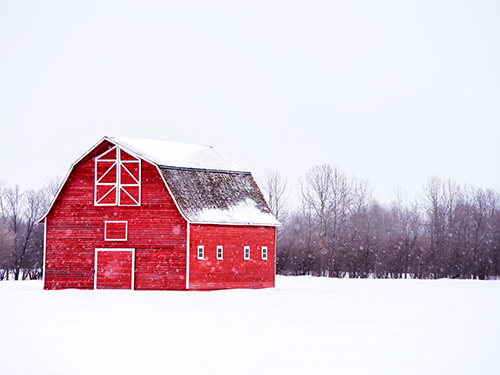Is Your Farm Ready for Winter?
Dec 30, 2024

Last year’s ice storm caught many farmers off guard, and unpredictable weather is always around the corner. Whether it’s freezing temperatures, snow, or muddy conditions, now is the time to prepare your farm for the challenges of winter.
Here’s a winter checklist to ensure a safe and productive season:
Inspect Barns and Equipment Sheds
Winter weather can quickly turn small maintenance issues into major headaches. Check for the following:
Prep Water Systems
Frozen pipes and troughs can derail your farm operations. Get ahead of the freeze by:
Stock Up on Winter Supplies
Running out of essentials during a storm is frustrating — and avoidable. Make a list of items you need, including:
Evaluate Pastures and Fencing
Winter conditions can weaken fencing and leave pastures muddy or hazardous. Walk your property to check for:
Prepare Your Livestock
Healthy, well-fed animals are better equipped to handle winter stress. Take these proactive steps:
Review Fire Safety Measures
Winter brings an increased risk of barn fires due to heaters, electrical equipment, and hay storage. To stay safe:
Check Equipment and Vehicles
Winter can be hard on farm machinery. Now is the time to perform routine maintenance such as:
Secure Feed and Bedding Storage
Moisture and pests can wreak havoc on your feed and bedding supplies in the winter. Double-check that storage areas are:
At Co-op, we know the work doesn’t stop when the temperature drops. Stop by your local Co-op to stock up on winter essentials — from livestock feed and tank heaters to ice melt and snow-clearing tools. Don’t wait for the next winter storm to hit — take action now to keep your farm running smoothly all season long!
Find the nearest Co-op location here. For more seasonal farm tips, check out the latest issue of The Cooperator.
Here’s a winter checklist to ensure a safe and productive season:
Inspect Barns and Equipment Sheds
Winter weather can quickly turn small maintenance issues into major headaches. Check for the following:
- Loose or missing roof shingles
- Cracks in doors, walls, or windows
- Drafts that could let in cold air (a sign of gaps that need sealing)
Prep Water Systems
Frozen pipes and troughs can derail your farm operations. Get ahead of the freeze by:
- Insulating pipes and faucets
- Draining and detaching hoses after each use
- Installing tank heaters or heated buckets for livestock
Stock Up on Winter Supplies
Running out of essentials during a storm is frustrating — and avoidable. Make a list of items you need, including:
- Extra feed, hay, and bedding for livestock
- Salt or sand for icy walkways
- Fuel for tractors, generators, or snow-clearing equipment
- Shovels, snow blowers, and ice scrapers
Evaluate Pastures and Fencing
Winter conditions can weaken fencing and leave pastures muddy or hazardous. Walk your property to check for:
- Loose or damaged fence posts and wires
- Overly saturated areas where mud will worsen with rain or snow
- Adequate shelter or windbreaks for livestock
Prepare Your Livestock
Healthy, well-fed animals are better equipped to handle winter stress. Take these proactive steps:
- Increase caloric intake as temperatures drop to help livestock maintain body heat
- Ensure access to clean, unfrozen water 24/7
- Check stalls, lean-tos, or sheds for leaks and drafts
- Monitor your animals for signs of stress or illness, as cold weather can weaken immune systems
Review Fire Safety Measures
Winter brings an increased risk of barn fires due to heaters, electrical equipment, and hay storage. To stay safe:
- Inspect your barn’s wiring for damage
- Avoid using space heaters, or never leave them unattended if necessary
- Keep hay dry to prevent spontaneous combustion
- Have fire extinguishers on hand and ensure everyone knows how to use them
Check Equipment and Vehicles
Winter can be hard on farm machinery. Now is the time to perform routine maintenance such as:
- Change oil, filters, and fluids
- Inspect tires for proper pressure and tread
- Add fuel stabilizers and ensure batteries are charged
- Test snow-clearing equipment and attachments to ensure they’re winter-ready
Secure Feed and Bedding Storage
Moisture and pests can wreak havoc on your feed and bedding supplies in the winter. Double-check that storage areas are:
- Waterproof and properly ventilated
- Protected from rodents and other pests
- Easily accessible, even in snowy or muddy conditions
At Co-op, we know the work doesn’t stop when the temperature drops. Stop by your local Co-op to stock up on winter essentials — from livestock feed and tank heaters to ice melt and snow-clearing tools. Don’t wait for the next winter storm to hit — take action now to keep your farm running smoothly all season long!
Find the nearest Co-op location here. For more seasonal farm tips, check out the latest issue of The Cooperator.